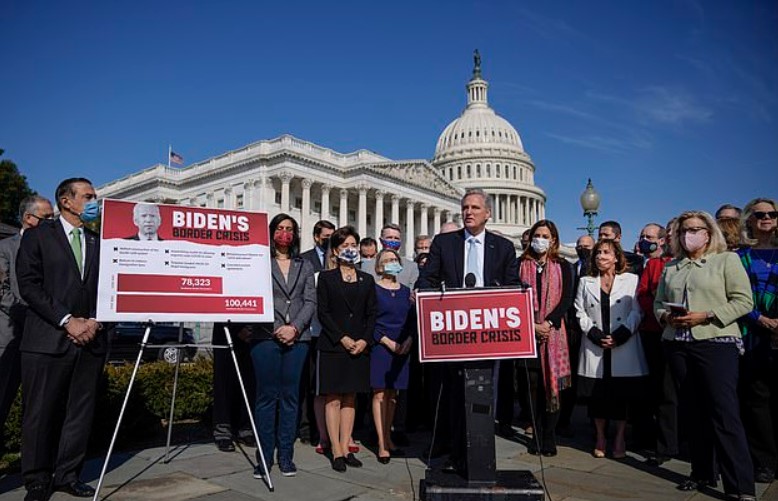The House Republican conference is facing a leadership crisis after the extremist faction of the party forced the ouster of Kevin McCarthy, the former speaker of the House, last week. McCarthy, who had been loyal to former president Donald Trump, was accused of being too moderate and compromising with the Democrats on key issues such as the debt ceiling, infrastructure, and immigration. The hardline conservatives, led by Rep. Marjorie Taylor Greene and Rep. Matt Gaetz, claimed that McCarthy had betrayed the party’s base and demanded a new speaker who would stand up to President Joe Biden and his agenda.

McCarthy’s removal was unprecedented in US history, as no speaker had ever been ousted by their own party before. The move also triggered a fierce internal battle among the Republicans, who are divided over who should replace McCarthy and what direction the party should take in the future. Some Republicans fear that the extremist wing of the party is alienating moderate voters and damaging the party’s chances of winning back the House and the Senate in the 2024 midterm elections. Others argue that the party needs to embrace Trump’s populist message and appeal to his loyal supporters.
Scalise and Jordan vie for speaker nomination
The two main contenders for the speaker nomination are Rep. Steve Scalise, the House minority whip, and Rep. Jim Jordan, the founder of the Freedom Caucus. Both are staunch conservatives and Trump allies, but they have different styles and strategies.
Scalise, who represents Louisiana, is seen as a more pragmatic and diplomatic leader, who can work with different factions of the party and build coalitions. He is also a survivor of a shooting attack in 2017, when a gunman opened fire on a group of Republican lawmakers who were practicing for a charity baseball game. Scalise was critically wounded and underwent several surgeries, but he recovered and returned to Congress. He has earned respect and sympathy from many of his colleagues for his courage and resilience.
Jordan, who represents Ohio, is seen as a more aggressive and confrontational leader, who can challenge and resist the Democrats at every turn. He is also a vocal defender of Trump and his baseless claims of election fraud. He was one of the leading figures in opposing the certification of Biden’s victory on January 6, 2023, when a mob of Trump supporters stormed the Capitol in an attempt to overturn the results. He has also been accused of ignoring or covering up allegations of sexual abuse by a former team doctor when he was a wrestling coach at Ohio State University.
Both Scalise and Jordan have expressed their interest in running for speaker, but neither has secured enough support from their colleagues to win the nomination. The House Republican conference is set to meet in a closed-door meeting on Wednesday morning to vote for their nominee by secret ballot. However, uncertainty looms over whether any candidate can secure enough votes to win the gavel.
House speaker election faces deadlock
The House speaker election is not only a matter of internal politics for the Republicans, but also a matter of national governance for the country. The speaker is the third-highest-ranking official in the US government, after the president and the vice president. The speaker presides over the House of Representatives, sets the legislative agenda, appoints committee chairs and members, and influences federal spending and policy.
To become speaker, a candidate needs to win a majority of votes from all members of the House, not just from their own party. This means that at least 218 votes are required to win the gavel. However, this could be a difficult task for any Republican candidate, given that the Democrats currently hold 222 seats in the House, while the Republicans hold 211 seats (with two vacancies). The Democrats are expected to back their own candidate, Rep. Hakeem Jeffries, of New York, who is currently the chair of the House Democratic Caucus.
Therefore, to win the speaker election, a Republican candidate would need to either persuade some Democrats to cross party lines and vote for them, or convince some Democrats to abstain from voting or vote “present”. This could be possible if some Democrats are unhappy with Jeffries or want to avoid a prolonged deadlock that could paralyze Congress. However, it could also be risky for any Democrat who breaks ranks with their party, as they could face backlash from their constituents or colleagues.
Alternatively, if no candidate wins a majority of votes after several rounds of voting, then the House could resort to other options to break the impasse. One option is to elect an interim speaker until a permanent one is chosen. Another option is to elect a bipartisan speaker who can appeal to both parties and bridge their differences. However, both options would require cooperation and compromise from both parties, which could be hard to achieve in such a polarized and hostile political environment.







